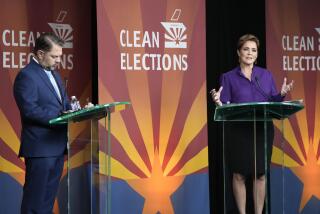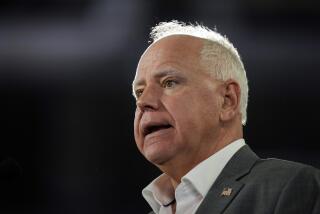In debate, Palin can unnerve foes, aides
ANCHORAGE — When she appeared for a candidate’s forum in front of a room filled with unionized Alaskan electrical workers during her run for governor in early October 2006, Sarah Palin was woefully unprepared. When the union members grilled her on labor policy, Palin faltered.
Afterward, a furious Palin cursed in anger and berated her staff, recalled two former senior campaign aides who blamed her unwillingness to bone up on workplace issues for the blunder.
But just a few weeks later, when Palin jousted with her two main rivals during critical pre-election debates, she was much more at ease. She distilled policy questions into simple answers and countered her opponents’ attacks with verbal thrusts delivered with a sunny smile.
When one moderator asked what she would do if one of her unmarried daughters became pregnant, Palin had a ready answer, defending her antiabortion stance and deflecting the question toward her male rivals: “I would choose life. And I am confident you will be asking my opponents these same scenarios?”
During Palin’s brief exposure to the high-stakes environment of political debates, she has unnerved both her handlers and her opponents. At times she has been handicapped by her lax approach to learning the nuances of policy and state issues, but she has also projected a Reaganesque ability to offer up pithy answers and charm on camera.
“The political landscape here is littered with people who have underestimated Sarah Palin,” said Eric Croft, a former state representative who ran for the Democratic nomination for governor in 2006 and appeared with Palin during several early forums.
Palin’s split-personality debate persona -- mirrored in her confident speech to the Republican convention in Minneapolis in early September and in a series of wobbly performances in recent television interviews -- poses a challenge for her Democratic opponent, Delaware Sen. Joe Biden, as Thursday’s nationally telecast vice presidential debate in St. Louis approaches.
Biden could face trouble, Alaskan political observers said, if he takes Palin too lightly. But he also has to take care not to be overly aggressive against a candidate who radiates telegenic appeal.
“She has a Reagan-like ability to win over audiences. But for someone who cares about issues and facts, it was rather startling to see her gloss over important questions,” said Andrew Halcro, an Alaska businessman who ran as an independent candidate for governor against Palin.
Biden, the garrulous Senate Foreign Relations Committee chairman, is also at ease on camera and often showed his command of foreign policy issues and his flashing wit during a string of Democratic Party presidential primary debates in 2007.
But he has stumbled before. A debate gaffe ended his presidential hopes in August 1987, when he used an anecdote about a family hampered by lack of economic opportunity -- without crediting the source, British Labor Party leader Neil Kinnock.
For its part, Sen. John McCain’s campaign appears to be taking no chances that Palin will prepare properly. It flew her Monday to McCain’s Arizona ranch to cram with a coterie of the GOP presidential candidate’s advisors.
As she began her run for governor of Alaska, Palin repeatedly proved difficult to prep for a debate, recalled her two former political aides, who had pivotal roles during her campaign but declined to be identified because of their continuing involvement in Alaska politics.
Palin, the former aides said, had a sharply limited attention span for absorbing the facts and policy angles required for all-topics debate preparation. Staffers were rarely able to get her to sit for more than half an hour of background work at a time before her concentration waned, hindered by cellphone calls and family affairs. “We were always fighting for her attention,” said one of the aides.
In mid-October 2006, Palin’s staffers saw their worries justified in the first political forum of the campaign season, an event at Anchorage’s 49 Supper Club, where candidates unveiled their stump speeches before a room filled with political players. The former Wasilla mayor breezed through an upbeat speech about “taking back Alaska” but struggled during a question-and-answer session.
“To her credit, she gave a lot of ‘I don’t knows,’ ” one former aide recalled. “But it was clear she didn’t start out with a great range of knowledge about Alaskan affairs.”
In the weeks that followed, Palin’s senior campaign aides took care not to let her repeat the dismal performance. “I was always frustrated because 30 minutes before game time, I’d want to say, ‘Let’s turn off the phone and lock the door. And please calm down,’ ” one of her former aides said.
But as time went on, Palin increasingly managed to zero in on the policy issues set before her during debate preparations, and her comfort level rose dramatically. During two final debates broadcast by Alaska public television and an Anchorage news station, Palin appeared to ace her performances, deftly crystallizing her talking points for voters.
“If you can sit her down, she has a talent for listening to a policy presentation that is so boring it would bring tears to your eyes,” the aide said. “Then -- boom -- she will nail it down to its essence.”
Palin often toted index cards when she walked out in front of the cameras, cribbing from them when the cameras were on her rivals. “She’d carry these cards with her like she was cramming for a test,” Halcro said.
Her debate strategists also warned Palin not to stray onto such hot-button topics as creationism and same-sex marriage. On questionnaires sent to socially conservative activists, Palin backed “intelligent design” alternatives to the theory of evolution and opposed nontraditional unions. But she managed to avoid those subjects during most of the debates.
Palin remained so low-key that even her pollster, David Dittman, confessed he was unaware of her strong Christian conservative tenets. “I didn’t know what she believed in,” he said. “We never had any discussions about it, and from our polls, Alaska voters had the same impression.”
By the final key televised debate in late October, Palin had grown used to the format, her aides and rivals recalled. Still using index cards, she was breezily confident in her back-and-forth with Halcro and former Alaska Gov. Tony Knowles.
Palin had ready answers on tough questions about social concerns such as native needs, abortion and assisted suicide. Sometimes her remarks seemed glib, but she was usually poised and sometimes kicked back at her opponents and questioners when they took the offensive.
Larry Persily, a panelist questioner in the campaign’s final televised debate, said Palin flummoxed her rivals “like Muhammad Ali dancing around the ring.” She avoided statements and tough questions that could have impaled her and repeatedly stung her opponents. And Palin, a former sportscaster, was easily the most comfortable in front of the camera. “She knows television,” said Persily, who participated in other debates and has watched Palin closely for years. “She knows how to look at her interviewer.”
Palin saved her most devastating riposte for the final question of the debate, when Persily asked the three candidates whether they would hire their opponents for a state job.
Knowles and Halcro offered halting jokes. But when it was Palin’s turn, she pounced.
Smiling at Halcro, who recited reams of statistics by rote, Palin observed that the businessman “would make the most awesome statistician the state could ever look for.”
As the debate audience laughed, Palin pivoted to Knowles, who had owned an Anchorage restaurant. “Do they need a chef down in Juneau?” Palin asked, smiling as she twisted the verbal knife. “I know Mr. Knowles is really good at that.”
Two years on, Halcro and Knowles admit they are still baffled by how their mastery of policy and state issues was trumped by Palin’s breezy confidence and feel-good answers.
“When you try to prove she doesn’t know anything, you lose, because audiences are enraptured by her,” Halcro said. “And her biting comments give you a sense of how competitive she is. Anybody who doesn’t take her seriously does so at their peril.”
--
steve.braun @latimes.com
tom.hamburger @latimes.com
More to Read
Get the L.A. Times Politics newsletter
Deeply reported insights into legislation, politics and policy from Sacramento, Washington and beyond. In your inbox three times per week.
You may occasionally receive promotional content from the Los Angeles Times.










